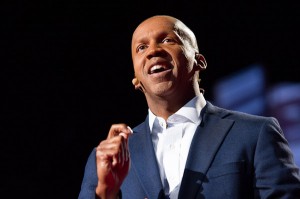Equal Justice lawyer Bryan Stevenson wins 2014 ALBA/Puffin Award
Bryan Stevenson, the founder and Executive Director of the Equal Justice Initiative, will accept the fourth ALBA/Puffin Award for Human Rights Activism award at ALBA’s annual event in New York on April 27. (Tickets | Video | Press Kit | Press Release | Comunicado de Prensa)
Stevenson has dedicated his adult life to fighting injustice, particularly in the U.S. criminal justice system. Born in Delaware, he graduated from the Harvard Law School and Kennedy School of Government and worked for the Southern Center for Human Rights in Atlanta representing capital defendants as director of the Alabama Capital Representation Resource Center.
In 1995 he founded the Equal Justice Initiative (EJI), a private, nonprofit organization that provides legal assistance to indigent defendants and prisoners who have been denied fair and just treatment by the legal system. The EJI litigates on behalf of condemned prisoners, juvenile offenders, people wrongly convicted or charged with violent crimes; poor people denied effective representation; and others whose trials are marked by racial bias or prosecutorial misconduct.
Based in Montgomery, Alabama, with a staff of more than forty, the EJI works in four distinct areas: children in adult prisons (seeking to abolish life sentences without parole for 13- and 14-year-olds); prisons and sentencing reform (spearheading litigation in 19 states to get a fair review of sentencing and parole-eligible re-sentencing); race and poverty; and the death penalty. (Stevenson has been instrumental in the reversals and reduced sentences in more than 75 death penalty cases).
In addition to working directly with defendants and inmates, the EJI has developed educational programs to raise public knowledge and awareness about the history of racial bias in the United States and its continuing legacy. “A deeper understanding about our nation’s history of racial injustice,” Stevenson says, “is important to addressing contemporary questions of social justice and equality.”
EJI’s Calendar of Racial Injustice, first published in 2013, combines striking images with historical entries and short essays about American racial history. Last December, the New York Times featured Stevenson in a front-page story about the EJI’s victory in a long-time fight in Montgomery for the placement of three historical markers explaining the city’s considerable role in the slave trade. The Alabama Historical Association, which resisted the initiative, did not deny the accuracy of the markers (which included the family names of prominent slave traders) but was wary of “the potential for controversy.” In the end it was Stevenson who personally persuaded the city’s mayor to give the green light.
In a TED talk from March 2012, which received the strongest standing ovation ever seen at TED and has been viewed by more than 1.5 million people, Stevenson called on the United States to come to terms with the “dark and difficult” chapters of its past. A lack of historical memory, he said, blinds the U.S. to the outrageous ways in which it treats large segments of its own population. “What would it feel like to be living in a world where Germany was executing people, especially if they were disproportionately Jewish? I couldn’t bear it. It would be unconscionable. And yet, in this country, in the states of the Old South, we execute people: You’re 11 times more likely to get the death penalty if the victim is white than if the victim is black, and 22 times more likely to get it if the defendant is black and the victim is white, in the very states where there are buried in the ground the bodies of people who were lynched.”
“I can’t think of anyone more worthy of this honor,” says Sebastiaan Faber, chair of ALBA. “Not only because the volunteers of the Lincoln Brigade fought on the front lines in the struggle against racism and for social justice and civil rights, but also because the Equal Justice Initiative, like ALBA, believes that injustice is rooted in lack of education and that teaching the United States about the dark chapters in its own history is an absolute necessity as we work toward a better Union.”
ALBA and the Puffin Foundation are not the first to recognize Stevenson for his groundbreaking work. His awards include a MacArthur Fellowship, the Reebok Human Rights Award, the ACLU National Medal of Liberty, the American Bar Association Wisdom Award, the Thurgood Marshall Medal of Justice, the Olof Palme Prize, the Gruber Prize for Justice, and, most recently, the 2013 Brennan Legacy Award.
The $100,000 ALBA/Puffin Award for Human Rights Activism, one of the largest human rights awards in the world, is given jointly by ALBA and the Puffin Foundation, which provides an endowed fund exclusively for this annual honor. “The award is designed,” said Puffin Foundation President Perry Rosenstein, “to give public recognition, support, and encouragement to individuals or groups whose work has an exceptionally positive impact on the advancement and/or defense of human rights. It is intended to help educate students and the general public about the importance of defending human rights against arbitrary powers that violate democratic principles.”
The ALBA/Puffin Award is part of a program connecting the inspiring legacy of the International Brigades —the 35,000 volunteers who helped fight fascism during the Spanish Civil War—to international activist causes of today. Spanish Judge Baltasar Garzón received the first ALBA/Puffin Award in 2011. Other previous winners include Kate Doyle and Freddy Peccerelli, who work on violations of human rights in Guatemala, and United We Dream, a national network of youth-led immigrant activist organizations that fight for the rights of millions of undocumented immigrants in the United States.













